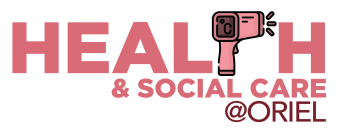Course Full Title: Cambridge OCR Level 3 Alternative Academic Qualification Cambridge Advanced National in Health and Social Care
Exam Board: Cambridge OCR (Cambridge University Press & Assessment)
Specification code: Extended Certificate: H125 (360 Guided Learning Hours)

Level 3 Health and Social Care
Cambridge Technicals in Health and Social Care offers a wide range of centre assessed units with practical and wider project-based assessment opportunities, as well as examined units on Equality, diversity and rights in health and social care, Health, safety and security in health and social care,
Students wishing to study the diploma course will be able to undertake units in Anatomy and physiology for health and social care and Personalisation and a person centred approach to care, and Safeguarding.
Cambridge Technicals in Health and Social Care focuses on the skills, knowledge and understanding that today’s universities and employers demand. Students will practically apply their skills and knowledge in preparation for further study or the workplace.
You will have the opportunity to develop professional and personal skills through interaction with people who either work in the sector or require care or support, as well as theoretical knowledge and understanding to underpin their skills. This will allow them to offer specific, person-centred care and support and build positive relationships with the people they are working with, so that their needs and requirements are met whilst they maintain control of their own care and support.
Students studying this course will consider the real impacts to people living with conditions or illnesses such as the social, financial and psychological impacts, not just the signs, symptoms and treatment of faceless conditions or illnesses. Students will also learn about the legislation and guidance supporting health and social care, so that they can ensure the people they are working with are not only able to access all the care and support they are entitled to, but are also able to protect themselves from any harm or abuse whilst at work.
Why study Health and Social Care?
This qualification is designed for students who are interested in pursuing a career or further study in the Health and Social Care sector. It will help you:
- Develop applied knowledge and skills relevant to the health and social care sector.
- Apply what you learn to practical, real-life contexts, such as recommending care and support or creating advice and guidance.
- Develop key knowledge, understanding, and transferable skills essential for progression to undergraduate study.
- Complement A Levels or other Level 3 qualifications as part of a Post-16 study programme.
What will I study?
The course is delivered through a selection of mandatory and optional units. For the Extended Certificate (360 GLH), you will study six units, including:
Unit Type Unit Title
Mandatory Principles of health and social care (F090)
Mandatory Anatomy and physiology for health and social care (F091)
Mandatory Person-centred approach to care (F092)
Mandatory Supporting people with mental health conditions (F093)
Optional (Choose 2) Supporting people with long term physiological conditions (F094)
Optional (Choose 2) Investigating public health (F095)
Optional (Choose 2) Supporting people in relation to sexual health, pregnancy and postnatal health (F096)
Optional (Choose 2) Supporting healthy nutrition and lifestyles (F097)
What makes a good Health, Social and Childcare student?
Success in this course requires a combination of academic and practical skills. Good students will:
- Be committed to independent learning and self-directed study, including completing research outside of lessons.
- Be willing to apply theoretical knowledge to solve practical problems.
- Develop transferable skills such as evaluation, planning, presentation, and research.
- Engage in critical thinking, analysis, and problem-solving relevant to health and social care scenarios.
- Focus on developing effective communication and collaboration skills.
Where could Health and Social Care take me?
This qualification is recognised in the UCAS tariff tables and is designed to support progression to Higher Education (HE). Related university courses you may progress to include:
- BSc Nursing (Adult, Child, Learning disabilities, or Mental health)
- BSc Midwifery
- BSc Health and Social Care
- BSc Paramedic Science
- BSc Public Health and Wellbeing
- BA Social Work
It could also lead to apprenticeships in the NHS and other health and social care sectors.
How will I be assessed?
The assessment is split between examinations and non-examined coursework units:
- External Assessment (Exams): Externally assessed units (like F090 and F091 for the Extended Certificate) are assessed by a formal exam that is set and marked by the exam board. These are available in January and June. Students are allowed up to three attempts per examined unit.
- Non-Examined Assessment (NEA): NEA units are applied or practical assignments that are internally assessed by your teacher and externally moderated by Cambridge OCR.
Grading
The qualification uses a compensatory approach. This means your final grade is based on the total combined marks achieved across all units, ensuring that every mark counts toward the qualification outcome. Students may still pass the qualification even if they do not pass every unit, provided they achieve enough overall marks. Grades will be Pass, Merit, Distinction or Distinction *.
What are the entrance requirements?
- 5 or more grades 4-9; including equivalents across at least 4 subjects.
- Maths and English Language Grade 4 or above
- Average GCSE GRADE of at least 3.5 (average of ALL GCSE full courses taken)
- Learners are not required to have studied Health and Social Care at Level 2, but this would be an advantage, with those students securing merit or higher, often doing better at Level 3








